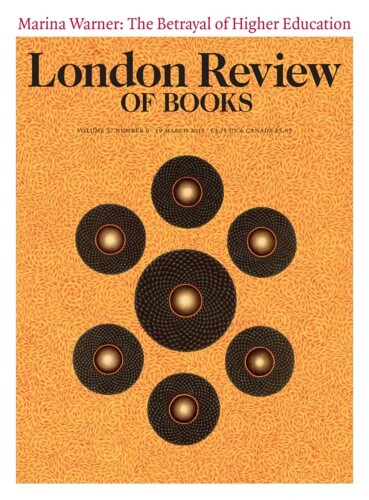Hendrick Avercamp (1585-1634): A Standing Man Watching a Skating Boy
No doubt, in a year or two, this child will be gone;
rumours of war in the air and boys at that age
always impatient for something.
The wide road that leads to the pond runs all the way out
to the press gang – you can almost taste
the glare of blood, the panic in the ranks,
the dead laid out in seams of fire or lye
(thus have they loved to wander;
they have not refrained their feet);
but, for now, he is safe; and the father admits
to a moment of guarded pride, which is never quite free
of misgiving (look at how close he stands
to where the boy is balanced on his skates, a kind
of beauty in the act of concentration).
We all have days like this, the quiet mind
dispensing with care to the greater or lesser extent
that circumstance allows: the steady light
above the frozen pond, the far-off
cries of other skaters, gangs
of schoolboys playing kolf amidst the crowds,
sleigh-bells, horse-bells, tradesmen, flocks of crows
come down to carrion: it has to be
a pleasure to be locked inside this maze
of noise and flow, of glint and spark and shadow.
This man won’t go to war; he’s too attuned
to maintenance and sleep, to being here
and knowing not to look
for trouble, since it’s bound to look for him.
For those without power, this is what passes
for wisdom: a homespun mechanics
of knowing how much of the world is already decided,
the favoured trinket crushed beyond repair,
the last good apples blackening the grass
for days, before they blur into the rain,
the splay-crack in the ice, the hidden culvert,
how anything can burrow to the heart
or chill the soul: a black wind off the sea,
a confidence misplaced, some casual lie,
those days out when the party stays too long
and lets the fever in; and yet, till then,
he has those blessings he and his
can muster, bread and lard, a little jam,
some twigs of ivy in an old, chipped jug
his mother used to have; his boy; his wife;
such gladness as happens, kindling his mind like the sun.
Handfasting
Giraldus Cambrensis, an early Welsh chronicler, reported that in ancient Wales, parents would ‘let’ their daughter to a prospective husband, who would put down a sum of money. If the couple decided to part and not be married, he would have to pay a further fee to the parents.
George Monger: Marriage Customs of the World
Had he mastered the thin domain
of self-denial,
replacing the skin with sleep, an implacable snow
of mothering and cold valerian,
the house of Spoken Word and Christmas Morn
become the castle in a fairy tale
where hearts are hung to dry
on fatted string,
he might have guessed
the limits of that bargain.
The day he brought her home,
the land felt small
for miles around, cold fields of mud and rain;
and that first night,
his beasts called in the dark,
a run of panic
streaming through the yard,
cold in his feet and cold at the roots of his eyes
while he fumbled against her, fingerless
and dumb.
Days turned to weeks;
the weeks to months, then years;
he set aside his mother’s favourite things
and bought the new one gifts, to exorcise
the ghosts she carried in
from who knew where;
till, finally, the house no longer his,
he gave it up and learned to love
its echo, rooms
of spice and bitumen,
his father’s shadow standing in the hall
at first light, things to do, the cattle
gathered in the barn on market days;
and all the time, a sense of something
creaturely, behind the cellar door,
more animal than human, so it made him
wonder what it was
he could have wanted,
or what he might have kept, had he but chosen
otherwise, what lost realm of desires
foregone, bright bodies slipping through his hands
the way a guddled trout might shiver free
just at the very last, that lovely
emptiness it leaves
between the hands,
and the puzzle of warmth
and marrow, swimming away
to everywhere,
a stream inside the stream
of light and water, single, almost free.
Send Letters To:
The Editor
London Review of Books,
28 Little Russell Street
London, WC1A 2HN
letters@lrb.co.uk
Please include name, address, and a telephone number.

